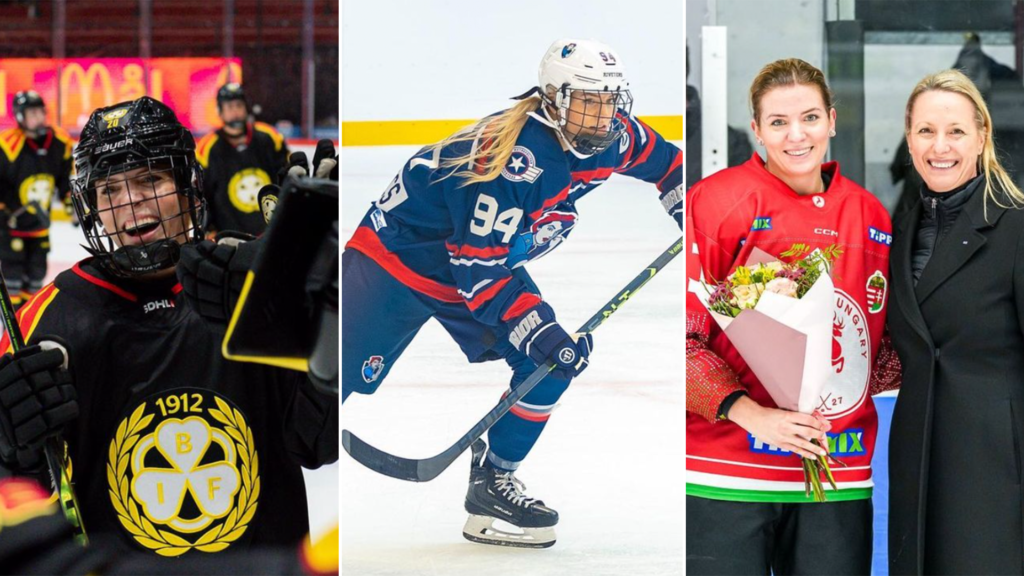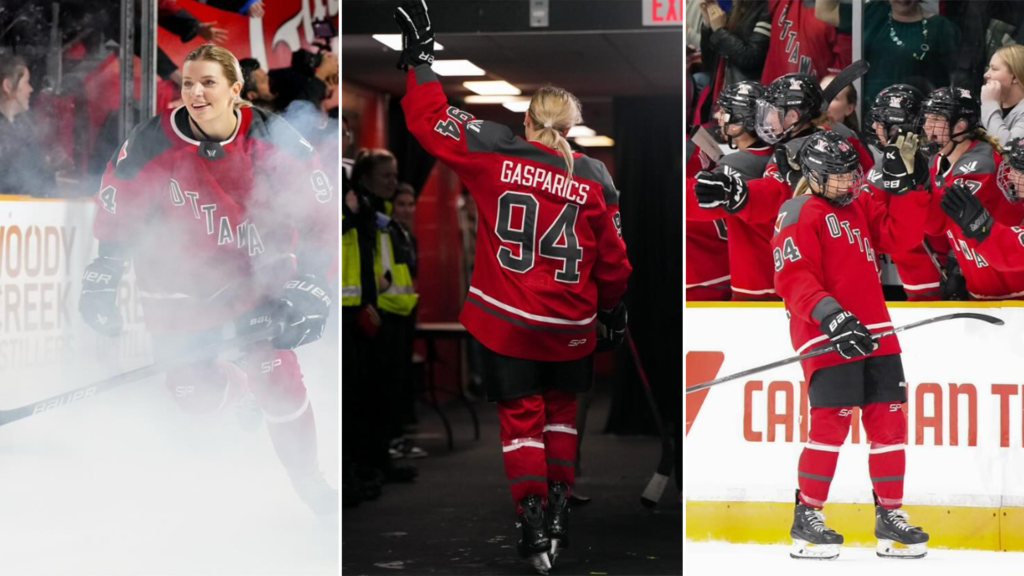Introduce yourself and share your background in hockey. How did you first get involved in the sport and what inspired you to take hockey seriously?
I am Fanni Garát-Gasparics, professional ice hockey player from Hungary.
I was just 7 years old when I started to play hockey. I have been skating since I was 3 years old thanks to my dad. My hockey career began in first grade when we came across a poster on the wall about a new hockey team inviting kids to practices. My parents decided it would be a good way to release all my energy so we decided to try it out. I fell in love instantly and asked my parents to bring me back on the ice. I played with boys and at first I didn’t really take it seriously. I just enjoyed playing the sport and liked the speed and adrenaline it gave me.
In 2009, Hungary launched a new women’s hockey program, focusing on the U18 National Team. It was then that I realized the emergence of a “golden generation” of talented girls capable of competing at the international level. This realization prompted me to elevate my commitment to hockey. While my dedication to the sport remained the same, I began to set specific goals and aspirations, such as representing Hungary in the A-pool World Championship and pursuing opportunities to play abroad.
Transitioning from Hungary to Ottawa must have been a significant step in both your hockey career, but also just life in general- what was that like?
I am fortunate enough to say that I’ve played in many different countries. I started my professional career in 2013 in Russia where I spent 5 years there. Since then, I’ve also had the privilege of playing in the USA, Sweden, and now, Canada.
Being away from home wasn’t a new thing for me, but a new country to live in. Playing professional hockey in the capital city of the most hockey-fanatic country in the world definitely feels special. I like the city and the people I met here are absolutely amazing.
How did you feel when first signing on with PWHL Ottawa and starting to play with the team?
When I was told they liked my game and work ethic enough to select me for the team, I was super happy and grateful. Being apart of this inaugural season of the best women’s hockey league in the world is truly remarkable and feels especially remarkable knowing how many great players are out there.
Right from the beginning, we started to build a great team culture. We have tons of talent and leadership in our group so it’s a privilege to be around my teammates both on and off the ice.
Walk us through what happened when you got injured in the game against Minnesota and how that was challenging for you – mentally, physically and emotionally.
Everything happened in seconds. I fell and twisted my knee and that was it. Injuries are never fun and there is never good timing for them. I am fortunate enough to say this is my first big injury in the 22 years of my career.
At first I couldn’t really accept it. I kept telling myself that this couldn’t be happening to me. I was hoping it was just a bad dream and that someone would wake me up.
To deal with the emotional and mental pain was way harder than the physical. But the support I got from my family, friends, teammates, staff and hockey fans means a lot to me and helps me in my daily life. I have people to turn to for advice/help and I am very grateful for that.
What are some of the biggest obstacles you are facing and how are you working to overcome them?
It took me a day or two to digest what is really happening with me and how long of a process is ahead of me. I remember I was sitting on my couch alone at home, crying and thinking about my best hockey experiences. I still have a few goals left in my career so I decided I am not done yet.
My work-ethic has always been my biggest strength and I’ve been through lots of challenges in the past so I know I can get through this and I’ll come back even stronger. Of course it is a long journey with ups and downs, but when I am down I think about my long term goals and that’s what keeps me on track.
Can you walk through what you are currently working on in regards to recovery?
After my surgery, I’ve been following the protocols that the doctor has given me and were consistently working together along with our team therapist. Really we’re just continuing to do different exercises for the knee and lots of muscle strengthening.
Working on your mental health is really important as well, so I continue to journal and write down notes about my small improvements and achievements from day to day.
Looking ahead, how do you plan to approach your return to the ice and continuing your hockey goals?
I strictly follow the instructions I get from the specialists and work a lot. Step by step, day by day, I build back up my strength. Until I can get back onto the ice, I’m working out at the gym and going to the shooting/skills court as much as I can. I believe strongly in the power of work, so that’s what I’m gonna do!
What would be your word of advice for people who may see themselves in a similar situation to you?
I know it’s easier said than done, but patience is key. I’m still learning this process myself, and finding it very difficult to deal with.
For those facing similar struggles, as I mentioned earlier, something I’ve found helpful is jotting down my daily achievements and successes. Even though progress might seem slow, acknowledging those small steps can provide a sense of accomplishment at the end of the day. Trust yourself and the hard work you put in and fill your mind with positive vibes because that will heal you!
Once back on the ice, what are you looking forward to the most?
Basically everything. Often I just close my eyes and visualize the feeling on the ice, hear the sounds of skating and feel the power of shooting. Obviously at first I will skate and slowly build up to fully being able to practice, but most definitely I cannot wait to play the game again.



